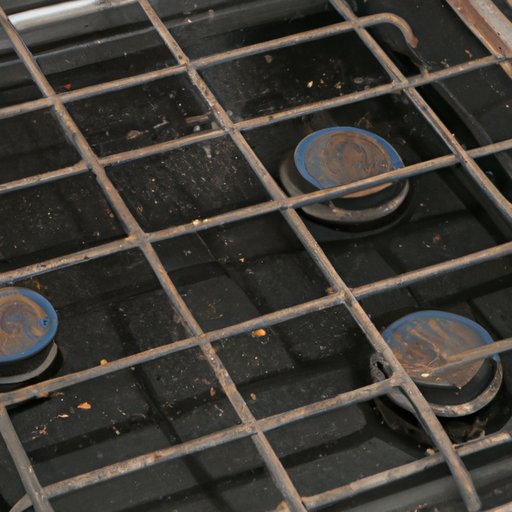
Introduction
Do dirty and greasy gas stove grates make you cringe every time you step into the kitchen? Don’t worry, you’re not alone! Gas stove grates are notorious for accumulating stubborn grease and food residue, making them one of the toughest kitchen items to clean. However, with the right tips and solutions, cleaning your gas stove grates can be quick and easy. In this article, we’ll share our best tips and tricks for cleaning gas stove grates, as well as homemade cleaning solutions and expert maintenance advice.
Quick and Easy Tips for Cleaning Gas Stove Grates
If you’re short on time and just need a quick and easy cleaning solution, there are a few methods that work like a charm. One of the easiest ways is to soak the grates in a vinegar solution for a few hours, then wipe away the grime with a soft cloth. You can also sprinkle baking soda on wet grates and let it sit for an hour, then scrub with a brush and rinse off with water. Another quick method is to place the grates in a plastic bag with ammonia for several hours, then scrub with a plastic brush and rinse thoroughly.
The Ultimate Guide to Clean Gas Stove Grates: A Step-By-Step Tutorial
If your gas stove grates are in serious need of a deep clean, follow our step-by-step tutorial. Start by removing the grates from your stove and soaking them for a few hours in hot soapy water. Use a soft-bristled brush or sponge to scrub away any stubborn stains, taking care not to use harsh abrasive cleaners that could damage the grates. After rinsing off the soap, dry the grates thoroughly with a cloth or paper towel and replace them on your stove.
The Best Tool for Cleaning Gas Stove Grates: A Comprehensive Review
There are many different tools and equipment that can be used to clean gas stove grates, from simple brushes to complex cleaning solutions. We’ve reviewed the best products on the market to help you make an informed decision. Some of our favorite products include a nylon scrub brush, which can be used to gently scrub away stains without damaging the grates. Additionally, we recommend using a non-toxic cleaning solution that is specifically designed for gas stove grates, such as Weiman Gas Range Cleaner and Degreaser.
5 Homemade Cleaning Solutions for Tough Stains on Gas Stove Grates
If you prefer using natural and eco-friendly products, there are several homemade cleaning solutions that are effective for removing tough stains on gas stove grates. One popular option is to mix lemon juice with baking soda and apply it directly to stains, then rinse off with water after a few minutes. Another great homemade solution is to mix equal parts of vinegar and baking soda to create a paste, then apply it to stains and scrub with a brush. For especially stubborn stains, mix ammonia with water and use it to soak the grates for several hours before scrubbing.
How to Maintain Gas Stove Grates: Expert Tips and Tricks
To prevent dirt and grease buildup on your gas stove grates, it’s important to maintain them regularly. After each use, wipe the grates down with a damp cloth or sponge to remove any leftover food debris. A weekly deep clean is also recommended to keep grates in optimal condition. This includes the soaking method and gentle scrubbing, as well as using a non-toxic cleaning solution to remove any stubborn stains.
The Dos and Don’ts of Cleaning Gas Stove Grates: Safety First!
When cleaning gas stove grates, it’s crucial to follow proper safety precautions and avoid using any products that could damage the grates or be harmful to your health. Be sure to wear protective gloves to avoid cuts or abrasions, and always avoid cleaning hot grates to prevent burns or other injuries. Additionally, avoid using harsh chemicals that could damage the grates, such as oven cleaner or abrasive scrubbers.
Conclusion
Cleaning gas stove grates may seem like a daunting task, but with the right tips and solutions, it can be quick and easy. So, try out these various methods and solutions and maintain your gas stove grates to keep them looking and functioning like new. Remember to always put safety first and avoid harsh chemicals or abrasive scrubbers.





